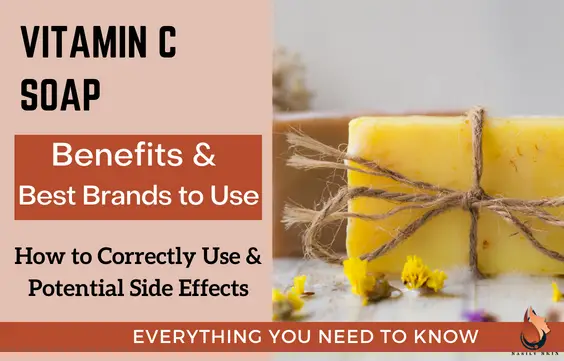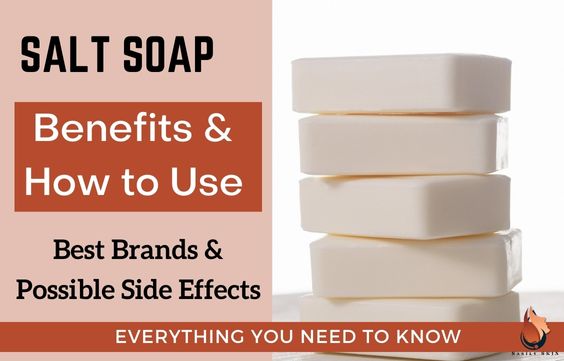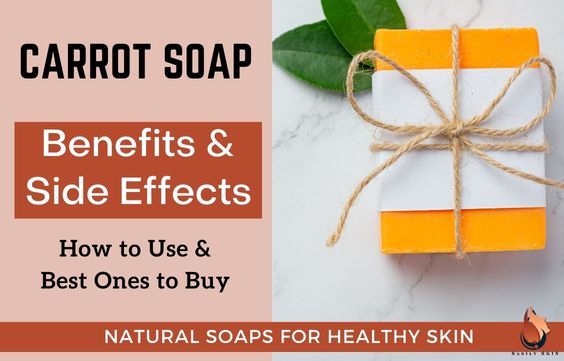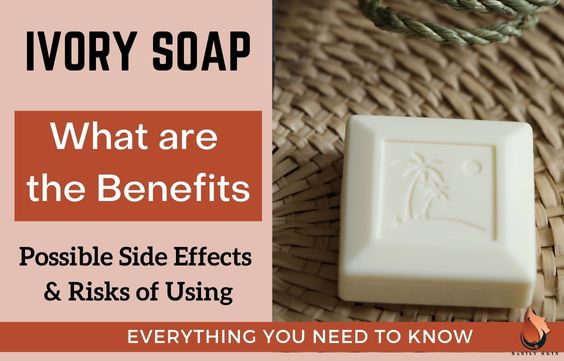Best Vitamin C Soaps -Benefits, Side Effects & How to Use

The most common form of Vitamin C being used in skincare today is Vitamin C serum. But did you know that there are also Vitamin C soaps that are super easy to use and great for your skin as well?
I have recently realized that these are a thing and I was excited to see how they work. I had questions: Do the work the same or faster? Do they have more or fewer side effects? Are they safe? So, let’s see what I was able to find out.
What Vitamin C Is & What It Does For The Skin
Vitamin C, also known as Ascorbic Acid, is an antioxidant that has great benefits for your body and your skin.
Our bodies cannot produce Vitamin C by itself so we need to obtain it from external sources (mainly through food and in skincare). It is most commonly used in skincare to combat the effects of photo-aging and free-radical damage on the skin.
Related Article: Vitamin C For Dark Underarms – How to Use, Benefits & Risks
Video: Vitamin C: How To Use It & The Benefits
Benefits Of Using Vitamin C Soaps
Just like Vitamin C serums and lotions, Vitamin C soaps are great for the skin. Benefits of Vitamin C Soap include:
1- Lighten Skin & Reduce Dark Spots and Scars
Vitamin C soap will gradually lighten your skin and even help to reduce dark spots, scars, and marks such as acne scars.
Vitamin C works to lighten your skin by inhibiting tyrosinase which affects melanin production in the skin. It also fights free radicals which cause sun damage that darken and age the skin. These actions, combined, will gradually lighten and brighten your skin.
Some other really good soaps to lighten your skin are
Best Kojic Acid Soaps- Benefits, Side Effects & How to Use
Best Papaya Soaps for Lighter Skin- Benefits & Side Effects
2- Nourishing and Cleansing
A Vitamin C soap will deliver Vitamin C into the skin while also cleansing. If you do not like the feel of serums and lotions on your skin, soaps are a great way to deliver certain ingredients to your skin. It is usually washed off after a few minutes of absorption.
3- Easy on sensitive skin
Vitamin C soaps are also great for people with sensitive skin that find leave-on vitamin C serums and lotions too harsh on their skin. Since the soap is washed off, it will be less irritating to the skin.
If you have sensitive skin consider using: Oatmeal Soaps Benefits- Can It Help Eczema & Psoriasis
Related Article – Best Niacinamide Soaps & Body Washes- Benefits & Risks
4- Effective in the same way as lotions and serums
The Vitamin C in the soap will work in the same way as the serums and lotions. It will still be able to help with all the same skin concerns (aging, spots, hyperpigmentation, hydration, collagen formations, etc).
Related Article – Carrot Soaps- Benefits, Side Effects & Best Ones to Use
5- Easier to use on large areas of the body
Serums and lotions can come in small portions that make it just not feasible to use them all over your body as you need. Soaps, however, are much more sustainable, and 1 bar (depending on the size) will last you at least 2 weeks even if you use it every day. They are usually very sudsy, making the product easier to spread all over your skin as needed.
6- Affordable
Vitamin Soaps are usually more affordable than Vitamin C serums and lotions. However, this can vary depending on the brand that you are using. However, since it lasts longer, it works out to be more affordable in the long run (at least for me).
If you suffer from acne then I recommend using these soaps:
Best Salicylic Acid Soaps – Benefits, Risks & How To Use
Benzoyl Peroxide Soap: Benefits, Side Effects & Best Ones
Glycolic Acid Soap- Benefits, Risks, How to Use & Best Ones
How To Use Vitamin C Soaps
Vitamin C soaps can be used all over the skin externally like regular soap (but you need to avoid getting in private areas).
When to use
You can use Vitamin C soap in the morning, at night, or both.
This will vary depending on what you are treating and how your skin reacts to the soap. Remember that Vitamin C is an active ingredient that is safe for use in the day but you still need to wear your SPF and moisturize.
Some people believe that using it at night is better because your skin is free from makeup and other products, which makes it easier for the skin to absorb it. However, there is no clinical proof that one time is better than the other.
Some other great natural soaps you can consider are:
Himalayan Salt Soap – Benefits, Side Effects & Best Ones
Best Salt Soap – Benefits, How to Use & Side Effects
How often to use a Vitamin C Soap
I recommend that you start by using vitamin C soap 2-3 times per week first, then gradually increase the frequency.
If you have sensitive skin, or if you are not sure how your skin will react to the soap, do a patch test and start gradually. While this will take a while, it will give your skin time to adjust.
In between uses, ensure to moisturize well. This will also help to prevent irritation and side effects. As you use the soap, you can gradually increase your frequency until you can use it every day.
Related Article: Using Moisturizer After Vitamin C: What You Need to Know
Can You Use Vitamin C Soap Everyday
You can use Vitamin C soap daily once your skin can handle it. This is why it’s best to start off using it 2-3 times a week to see if your skin can handle it and then gradually increase how often you use it.
Related Articles:
Vitamin E Soaps- Benefits, Uses & Side Effects
Ginger Soaps- Benefits, Side Effects & Do They Really Work
Sulfur Soaps- Benefits, Side Effects, How to Use & Best Brands
Choosing the right soap
When choosing a soap, look for one that will have a suitable concentration of Vitamin C and one that is devoid of harsh or drying ingredients.
Remember that soaps, because of their formulation, have the capability of drying out your skin. It can also easily irritate your skin because soaps are designed to dissolve oils from your skin (stripping). The oils usually form a protective barrier over and around your skin cells, keeping them nice and moisturized.
However, dry skin cells are easily irritated, which can cause skin damage.
If you already have dry or sensitive skin, avoid using soaps with ingredients like sodium lauryl sulfate (SLS), fragrances, ethyl, alcohol, and synthetic colors or dye. Instead, look for soaps that contain plant oils (olive oil, jojoba oil, cocoa butter, etc), glycerin, lanolin, and/or hyaluronic acid. These can help to moisturize your skin.
If you are using Vitamin C soap with other active ingredients like kojic acid, or retinol, ensure that the concentrations are suitable as too much can irritate your skin.
I recommend talking to your dermatologist about using soaps like this based on the condition of your skin.
Related Article – What are pH-Balanced Body Washes- Benefits & Best Brands
Best Vitamin C Soaps To Use
1- Australian Vitamin C & Valencia Orange Botanical Soap
The main ingredients in this soap are Vitamin C for hydration and nourishment, and Valencia orange oil for a fresh scent. It is said to keep your skin clean and hydrated while Vitamin C works its magic.
You can Click here to see the Australian Vitamin C Botanical Soap on Amazon.
2- White Kojic Acid & Vitamin C Soap- Best for dark spots
If you are tackling dark spots and pigmentation like me, but you also want the anti-aging benefits of antioxidants, then this is the soap for you.
I love my vitamin C, but I am also impatient. And while vitamin C gradually works for my mild spots and the general texture of my skin, I wanted something with vitamin C that would work faster. So I chose this soap. It’s great for my sensitive skin (including my face) and as long as I moisturize well, it does not make my skin too dry.
Its main ingredients are kojic acid and vitamin C, along with some other great ones like honey, hyaluronic acid, and glycerine to nourish the skin as well.
You can Click here to see the price for the White Kojic Acid & Vitamin C Soap on Amazon.
3- Basis Vitamin Bar
This bar soap contains Vitamins C, E, and B5 which all help to boorish the skin and fade dark spots and wrinkles. It is great for sensitive and dry skin and can be used all over the body including the face (but excluding the privates).
You can Click here to check out the Basis Vitamin Bar on Amazon.
Frequently Asked Questions (FAQs)
Does Vitamin C soap treat acne?
Vitamin C has some anti-inflammatory properties that can make it helpful in reducing the swelling, redness, and inflammation that occur with cystic acne, but most doctors will not use Vitamin C to actually treat acne.
Vitamin C also increases collagen production which helps in the healing of acne lesions and in the structural repair of the skin. Its brightening properties help to treat acne scars and hyperpigmentation that many acne-probe people have the misfortune of dealing with.
Can you use Vitamin C soap on your face?
Yes, you can use Vitamin C soap on your face. However, the reaction of your skin will depend on how strong the soap is, the other ingredients in the soap, and how sensitive your skin is.
I recommend checking your soaps to make sure there are no ingredients in them that are toxic, irritating, drying, or too harsh for your skin. Also, check that the concentration of Vitamin C is suitable.
Always patch-test your skin before applying any treatment all over.
Can you use Vitamin C soap on your private areas?
You can use Vitamin C soaps on the external skin of your private areas, but you should make sure not to get it on the sensitive, internal areas (soft, mucosal skin).
The ingredients in these soaps may be too harsh for your skin and can unbalance the pH of your private areas. This is very important for preventing infections and irritation.
For a really nice body wash that is made for washing sensitive areas you can consider Lume Acidified Body Wash, click here to learn more.
Side Effects Of Using Vitamin C Soaps
Generally, Vitamin C is very safe to be used topically. However, if applied in too high concentrations or if the soap has other drying ingredients, it can cause dryness and irritation, especially if used with other acids.
Related Article: Skin Purging from Vitamin C – What You Need to Know
In most clinical studies, it is shown that Vitamin C is safe for the skin in concentrations up to 10% without having side effects.
This can be different based on how sensitive your skin is and the other ingredients you use in your routine. However, I recommend that you patch test your skin first, and you start with a relatively low concentration first to familiarize your skin with the ingredient.
If you notice that you are having redness, stinging, bumps, itching, or pain around the area where you are using the soap, try moisturizing more often, lessening the concentration that you are using, and/or lessening the frequency of use.
Related Article: Using Moisturizer After Vitamin C: What You Need to Know
If none of these methods helps, then you may need to re-evaluate your skincare routine to see whether other ingredients are reacting with Vitamin C, or if you need to consider other options.
Related Articles
Are Carbolic Soaps Safe – Benefits, Risks & Side Effects
Ivory Soap – Benefits, Side Effects, What You Need to Know
Irish Spring Soap- Is it Good, Benefits, & Side Effects
Sources
Vitamin C in dermatology – PMC
Topical Vitamin C and the Skin: Mechanisms of Action and Clinical Applications – PMC
Harvard Health – Why is topical vitamin C important for skin health?
Vitamin C and Skin Health | Linus Pauling Institute Oregon State University
What Does Vitamin C Do for Your Skin?
Derms Say Vitamin C Is the Ultimate Brightening, Anti-Aging Antioxidant—Here’s Why
Vitamin C for skin care: Benefits, plus 3 products







